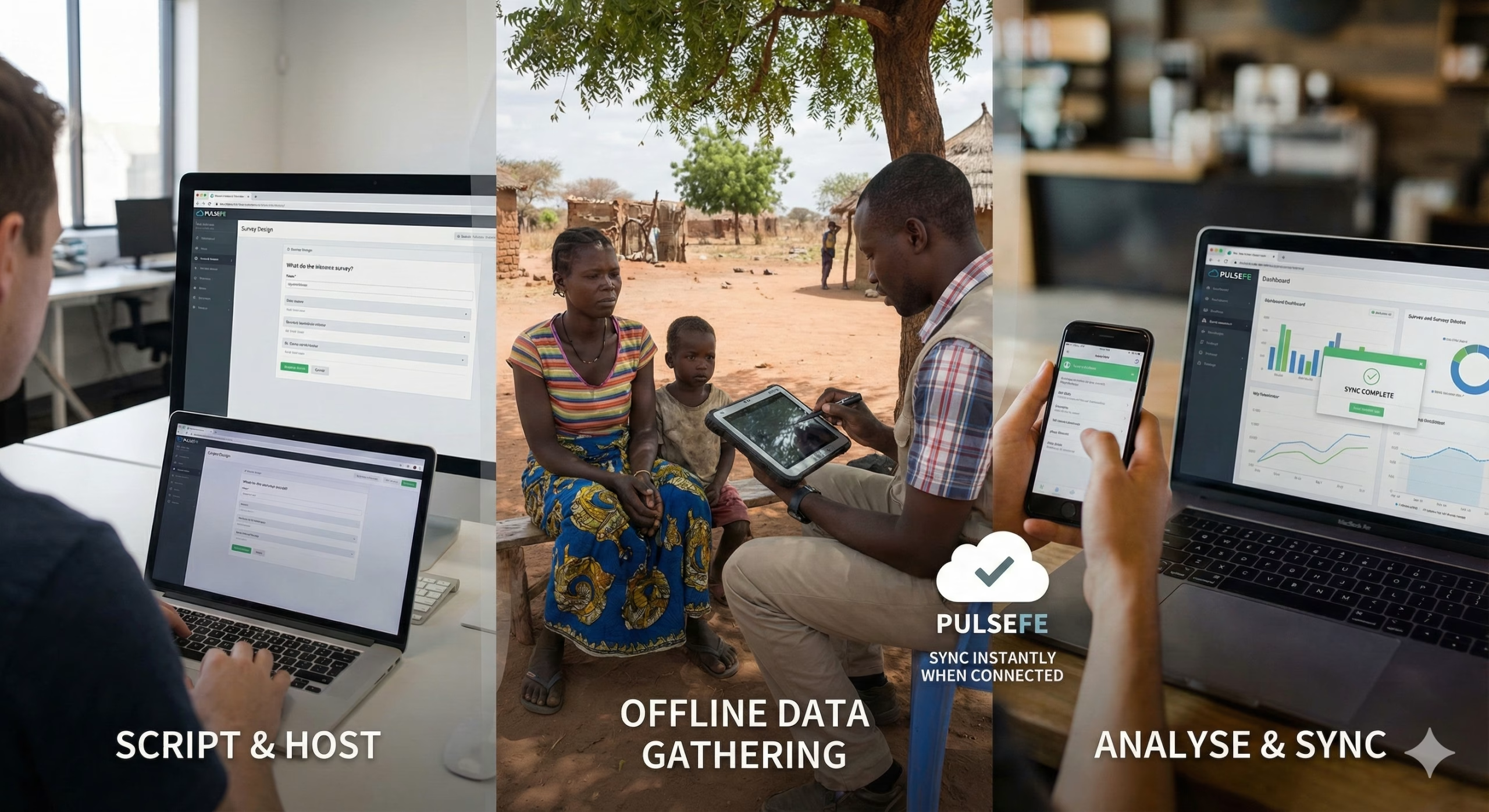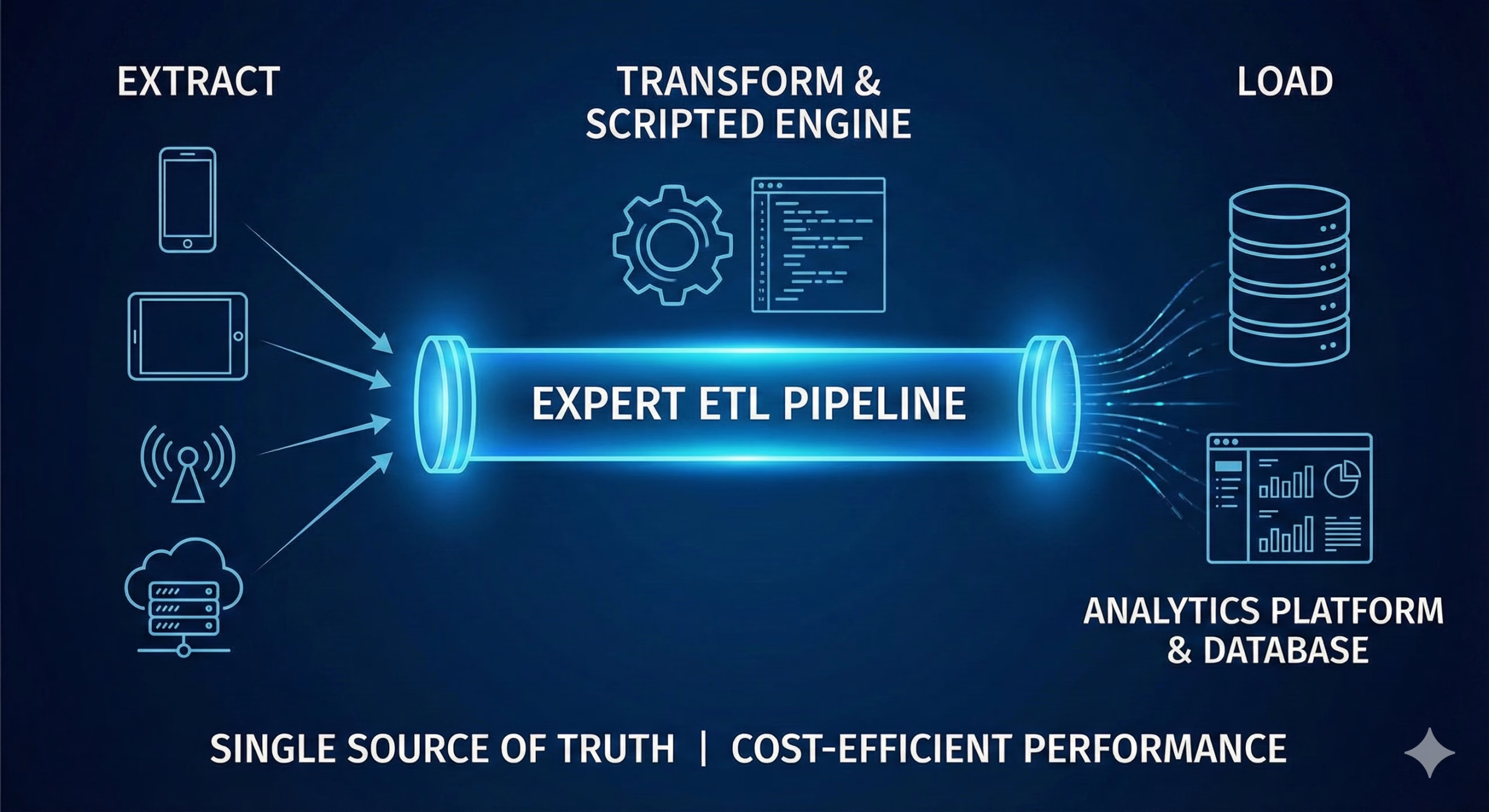Pulse AI
Transcriber Pro
Python-based desktop agent for secure local processing. Harness the 99.99% accuracy of the Gemini API for elite transcription and ✨ intelligent summaries.
Our Solutions
An AI-First Approach Data-Driven Technologies for Modern Business
From custom AI models to offline mobile surveys, we build the intelligent infrastructure that powers your insights.

AI-Assisted Custom Services for Market Research
We don’t just use tools; we build them. Our team develops bespoke software solutions specifically for the market research industry. By integrating cutting-edge AI into your workflow, we create custom applications that automate complex tasks, ensuring your unique methodology is preserved while efficiency skyrockets.
- Tailor-made software to fit your specific research protocols.
- Automated quality control and intelligent data cleaning.

Script, Host, & Analyse Affordable Mobile Questionnaires
Overcome technical barriers with PulseFE. Our 100% offline mobile survey system allows Market Research Organizations to gather critical data anywhere—even without internet—and sync instantly when connected.
“A Double project costs at least 3 times more than a PulseFE project.” — Client TestimonialVisit PulseFE Site for Details

Enterprise-Grade Retail Audit System
A comprehensive, end-to-end solution tailored for modern retail operations. From dashboard-driven monitoring to manpower management, we improve decision-making standards across the board.
- Scalable architecture proven over 5 million audits.
- Real-time data capture with photo documentation.
- Rich dashboards & analytics for store-level insights.

Comprehensive Census Services
SoftOfficePro offers full-scale census and market mapping capabilities tailored to distribution sectors. Using mobile data collection with GPS tagging, we map outlets, households, and commercial areas to provide the foundation for robust market penetration strategies.
Explore Census Services
Expert ETL Pipeline Development
ETL (Extract, Transform, Load) pipelines are the engineering backbone of a data-driven organization. We build scalable, automated pipelines that seamlessly transport data from your field sources to any database or analytics platform.
Scripted from scratch: Our pipelines are built for performance to deliver a single source of truth, far more cost-efficiently than generic services.
View Data Engineering Solutions
Power BI Dashboards: Transform Data into Action
The true power of a dashboard lies in the data integrity behind it. We provide end-to-end services—from expert ETL coding to visually stunning Power BI dashboard design.
See Dashboard Examples
AI-Driven Open-Ended Text Coding
Faster than ever. Powered by the PulseAI Intelligence Engine, we automate the processing of your open-ended data. We use our own in-house tools to ensure data privacy and rapid turnaround times.
Simple, Transparent Pricing
No subscriptions. No retainers. Just pay for what you need.

AI-Driven Qualitative Interview Analysis
Stop spending weeks transcribing and tagging. Our advanced AI models process your qualitative interviews instantly.
Unlocking the Power of
Artificial Intelligence in Data Science
Artificial Intelligence has revolutionized Data Science, bringing unprecedented capabilities to analyze, interpret, and derive insights from vast datasets. At SoftOfficePro, we harness this synergy to open new frontiers for businesses, ensuring precision, efficiency, and smarter decision-making.
Automated Data Processing
We utilize AI algorithms to automate the tedious cleaning and preprocessing of raw data. This significantly reduces manual errors and accelerates the entire data analysis pipeline.
Predictive Analytics
Leveraging advanced machine learning, we turn historical data into foresight. Our predictive models help businesses forecast trends and outcomes for superior strategic planning.
Complex Pattern Recognition
AI excels where traditional methods fail. We identify complex patterns and hidden trends within your data, which is invaluable for anomaly detection and uncovering new opportunities.
Natural Language Processing
Our NLP solutions enable machines to understand unstructured human language. From sentiment analysis to intelligent chatbots, we bridge the gap between data and dialogue.
Image & Speech Recognition
We implement AI-driven analysis for multimedia data. This technology is critical in sectors like healthcare for medical imaging and enhances user interaction through speech-to-text.
Personalization Engines
By analyzing user behavior, we power recommendation systems that drive engagement. Perfect for e-commerce and streaming, delivering the right content to the right user.
Enhanced Decision Support
Move beyond intuition. Our AI augments decision-making by providing data-driven insights, analyzing diverse datasets to offer informed, concrete recommendations.
Fraud Detection & Security
Enhance your security posture. Our algorithms detect anomalous patterns indicative of fraud, helping organizations preemptively address potential security breaches.
Scalability & Efficiency
Overcome the limitations of traditional computing. Our cloud-based AI solutions offer the flexibility to process massive datasets and handle varying workloads efficiently.
Continuous Adaptability
Static models fail in dynamic environments. Our AI models continuously learn and adapt to new data, improving accuracy over time and keeping your business ahead of the curve.
Real-Time Intelligence
Delayed insights are missed opportunities. We deploy AI systems that process data streams in real-time, enabling instant reactions to market shifts and operational anomalies.
Ethical AI & Governance
Trust is paramount. We implement robust frameworks for fairness and transparency, ensuring your AI solutions are unbiased, compliant with regulations, and ethically sound.
Ready to Amplify Your Capabilities?
The integration of AI into Data Science offers a powerful toolkit for analysis, prediction, and support. We help industries harness this potential for a future of unprecedented insights.
Talk to Us
Uncapped ODK &
XLSXForm Hosting.
Ditch submission limits and high costs. We provide a specialized, high-performance cloud built specifically for ODK Collect, SurveyCTO, and KoboToolbox workflows.
No Submission Caps
Collect data without limits.
Turbo Sync
Instant media-heavy uploads.
Isolated Data
Enterprise-grade sovereignty.
The Smart Move for ODK Power Users
PulseFE Pro is built specifically to bridge the gap between “free-tier” limitations and overpriced “enterprise” licenses.
Native Performance
Optimized ODK-native core means faster form loading and zero compatibility issues with complex XLSXForm logic.
Scale Without Penalties
Most platforms punish growth. PulseFE Pro removes submission brackets, letting you focus on data quality, not quotas.
Data Sovereignty
Isolated instances with dedicated resources ensuring your reporting dashboards load instantly.
99.9% Uptime
Carrier-grade reliability.
ISO Certified Cloud
Bank-level security protocols.
24/7 Support
Expert ODK troubleshooting.
Transparent Pricing
PulseFE Starter
For small NGOs and teams.
- 10k Submissions
- Standard Support
PulseFE Pro
For professional research.
- Unlimited Submissions
- Priority Support
Companies who work with us
to Script and host affordable questionnaires & analyze data










